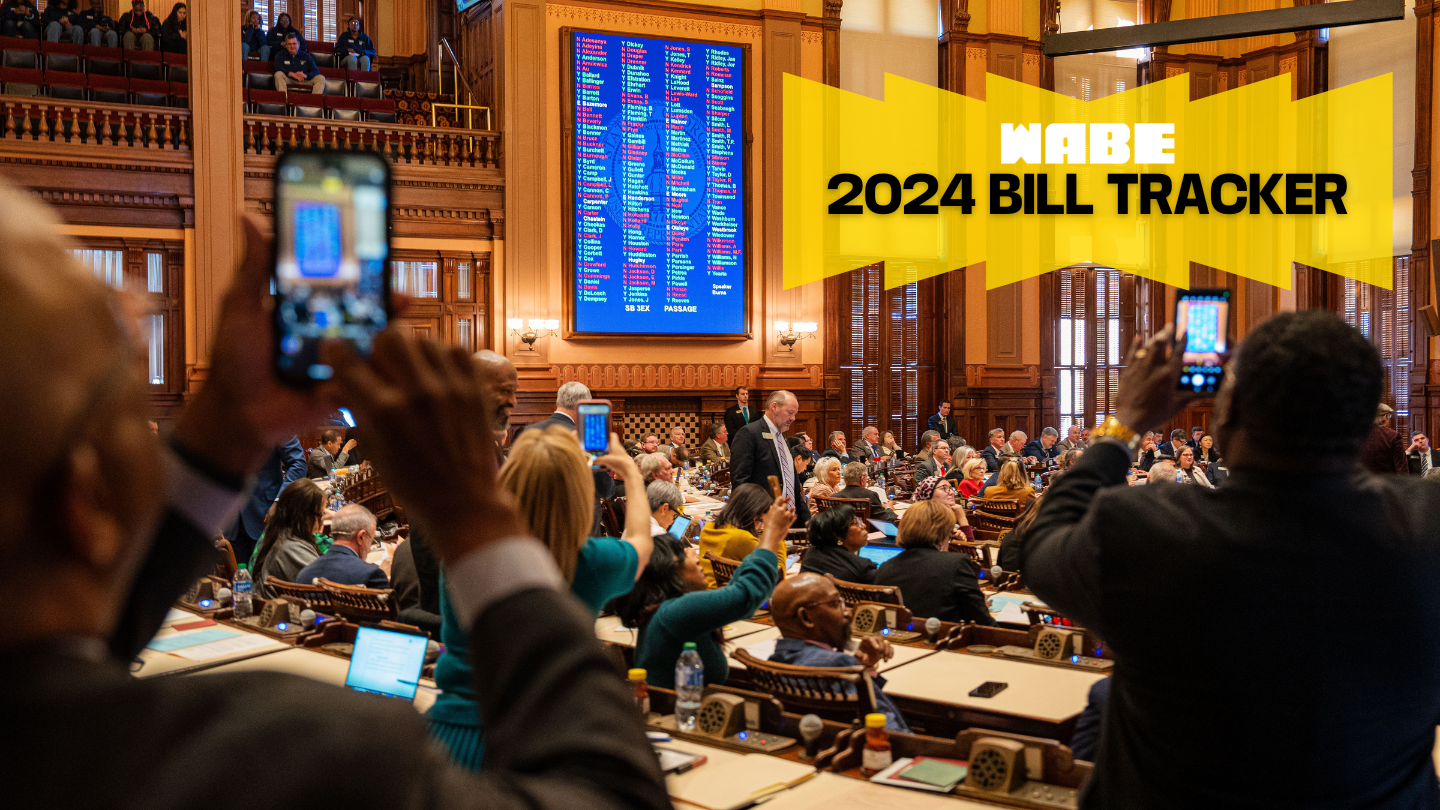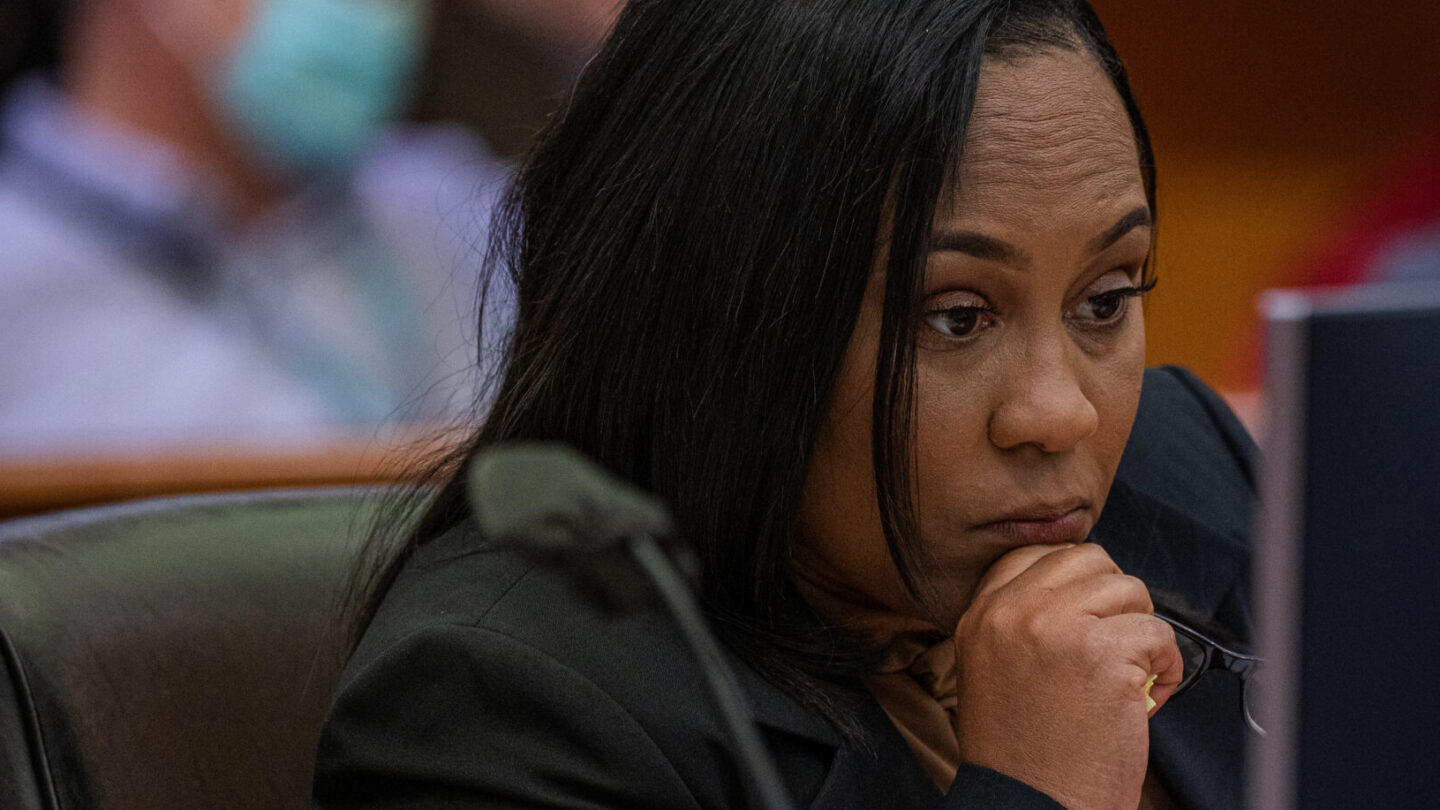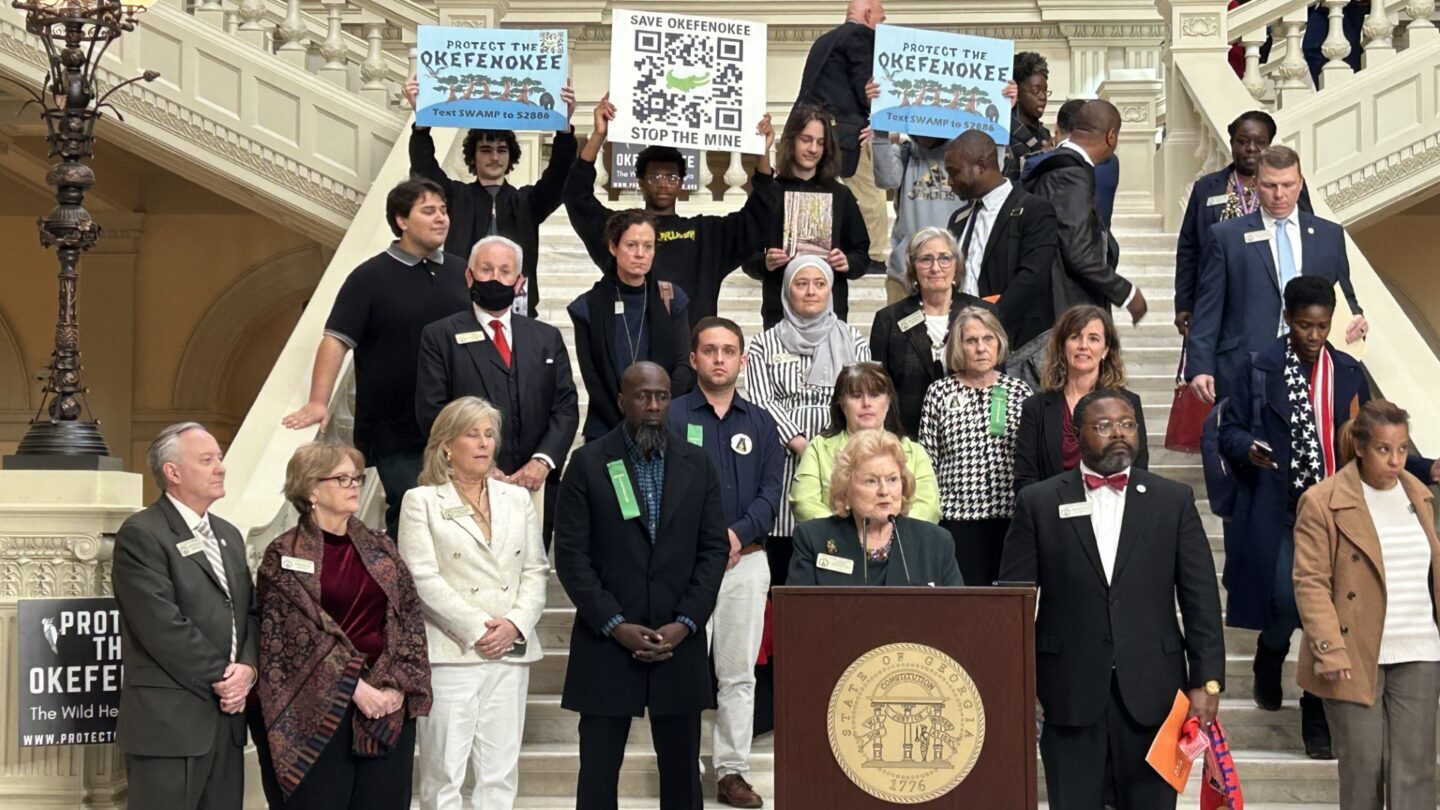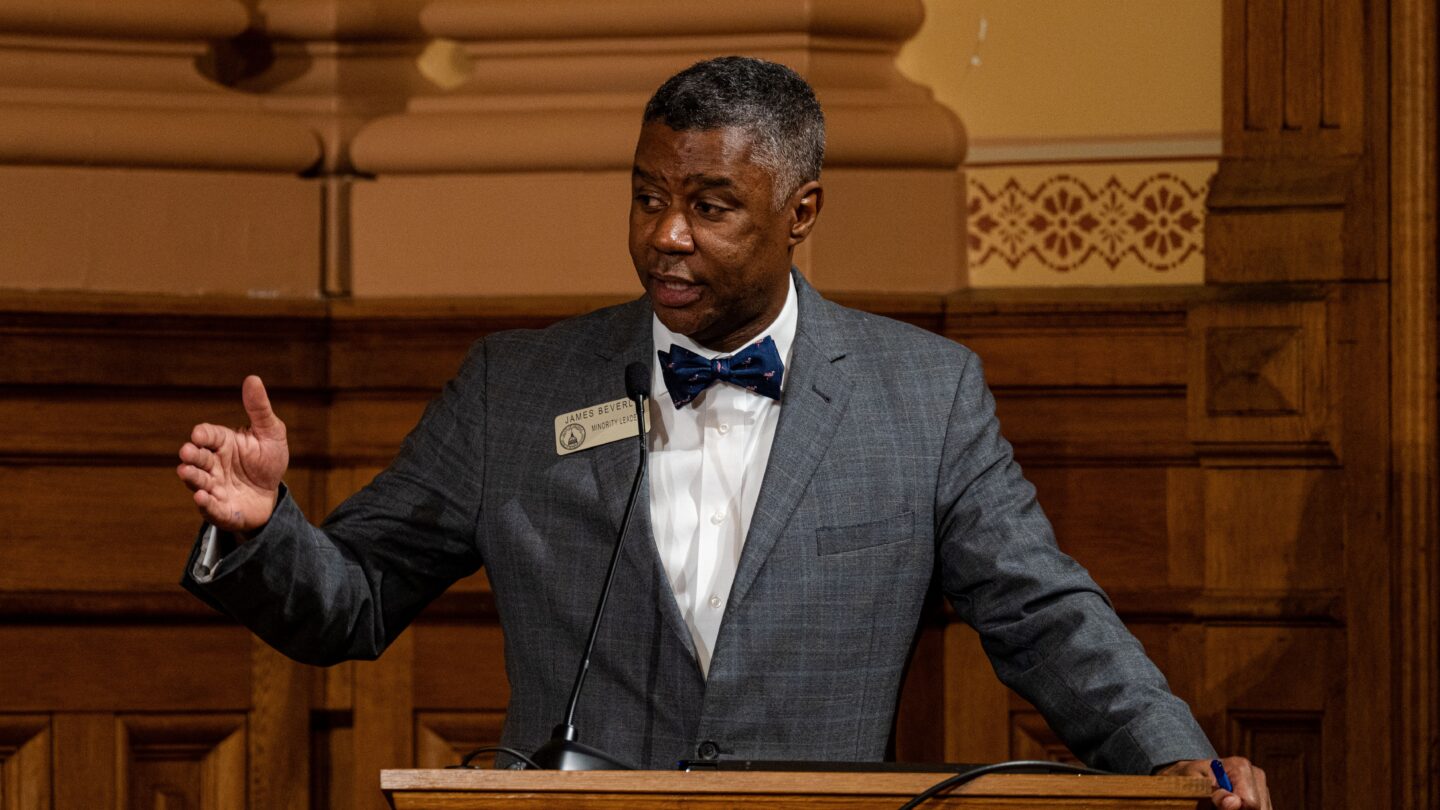2024 Gold Dome Bill Tracker

The Georgia General Assembly’s 40-day session is well underway. Lawmakers are weighing hundreds of bills on everything from education and health to criminal justice and housing ahead of “Sine Die” — the final day of the session on March 28.
Politics reporters Sam Gringlas and Rahul Bali, supervising digital news editor Patrick Saunders and the WABE newsroom are tracking many of these bills and are here to keep tabs on why they matter and where they stand. Check back for updates as the session goes on — we’ll do our best to keep this page updated as bills move and change.
After a bill clears its committee in the House or the Senate, the respective rules committee can move to schedule it for a vote in the full chamber. That process then repeats on the other side of the Capitol before the legislation can head to the governor’s desk. If any changes are made to the bill, it has to go back to the other chamber for another vote.
Typically, legislation must pass either the House or Senate by Crossover Day on Feb. 29 to have a chance at becoming law. But sometimes, the text of one bill can be glued into another that’s already cleared one chamber, known as a vehicle or a zombie bill.
You can view the 2023 Bill Tracker here.
And yes, we know this bill tracker list isn’t exhaustive. Hear about a bill you want to know more about? Let us know at tellus@wabe.org.
Last updated: Tuesday, April 23 at 9:47 a.m.
Bill Status Key

Categories
Click a category name to jump to that section

Business & Economy
Restricting Labor Unions (SB 362)
What the bill does: The bill backed by Gov. Brian Kemp would tie state incentives to how a company allows workers to seek union representation. For example, if workers at the Hyundai plant under construction want to organize, under Senate Bill 362, they can only do so with a secret ballot election instead of signing union cards, or else the company will not qualify for state incentives.
What supporters say: Republicans argue that secret ballots protect workers’ identities when it comes to union votes compared to voluntary recognition, which this bill would restrict. “This just says after Jan. 1 2025, if you’re gonna get an economic incentive from the state of Georgia, you have to allow individuals to cast a secret ballot. It is not a requirement,” says Republican Sen. Bo Hatchett.
What opponents say: Opponents say with thousands of EV jobs set to arrive here, this legislation attacks those workers’ right to unionize. Sen. Nabilah Islam Parkes says the bill violates federal laws.
“We know that there will be a lawsuit from Georgia unions, and the Republican Party will lose in trying to strip away workers’ rights,” she says. “And this will cost Georgia’s taxpayers hundreds of thousands of dollars and we should prioritize health care, education and infrastructure.”
Status: Passed in the Senate on Feb. 8 and in the House on March 20. Gov. Kemp signed it into law on April 23.

Learn more here.
–Marlon Hyde, WABE Business Reporter
Changes to the Film Tax Credit (HB 1180 & SB 349)
What the bill does: This bill doubles the minimum amount that productions have to spend in Georgia to $1 million to qualify for the base 20% tax credit. To receive an extra 10% tax break, filmmakers would also have to complete at least four of 10 measures, like hiring at least half of the crew and vendors from Georgia or doing some type of marketing for the state, like showing the Georgia peach logo in credits.
What supporters say: Sponsors want a better return for taxpayers from Georgia’s film credit. A few months ago, an audit prepared by Georgia State University found that the state saw a return of less than 20 cents on the dollar.
What opponents say: Opponents worry the new requirements will negatively impact smaller productions like commercials and music videos.
Status: Passed in the House on Feb. 29 and passed in a Senate committee on March 21, but with several changes. As of March 28 — the final day of the session — the bill was stuck in committee and likely dead for the year. But language from HB 1180 was added to SB 349 (a bill about ad valorem taxes) on Sine Die and it passed in the Senate. The bill failed to pass the House by Sine Die.
Learn more here.
–Marlon Hyde, WABE Business Reporter
Legalize Online Sports Betting (SB 386 and SR 579)
What the bill does: The bill and resolution work in tandem to allow sports betting in Georgia. Senate Bill 386 would allow sports betting, while Senate Resolution 579 creates the voter referendum for a constitutional amendment to allow betting with changes to where revenues go.
Eighty percent of new revenues would go to pre-K and HOPE, with the priority of fully funding pre-K. Fifteen percent would go to a new Responsible Gaming Fund for education and services connected to gambling addiction. Five percent would go to a new sports promotion fund for things like the costs of attracting major sporting events. There is debate on how much money it would create for the state. Those numbers have ranged from $30-$200 million a year.
What supporters say: Supporters say Georgia is missing out on millions in tax revenue. Thirty-eight states already allow it. Some hope this will be the first step toward a wider expansion of gaming including casino gambling and horse racing.
What opponents say: Opponents include those against expanding any gambling in Georgia, including on religious grounds and because gambling addiction can cause issues for individuals and families.
Status: SB 386 and SR 579 have both passed the Senate and are now in the House. A House committee on March 28 — the final day of the session — amended the measures stripping out the 5% that would go to new sports promotion. The measures did not pass in the full House and Senate by Sine Die.

It is important to note that SR 579 needs a two-thirds majority vote, which would require bipartisan support. Then, the measure needs approval by Georgia voters.
Learn more about SB 386 here and SR 579 here.
–Rahul Bali, WABE Politics Reporter
Suspending Data Center Tax Breaks (HB 1192)
What the bill does: This bill would suspend the current sales tax exemption offered to high-tech data centers when they purchase their equipment. It also creates a commission to study where to locate new data centers and how to power them. The bill comes in response to Georgia Power’s surprise request to make and buy more energy to meet a boom in demand that the company says comes mostly from new data centers.
What supporters say: Proponents of this move say Georgia Power’s request is proof the state needs to pump the brakes on bringing in energy-intensive data centers, which they argue don’t create enough jobs to justify a tax break and energy headaches.
What opponents say: Business groups and the data center industry say suspending the tax break would stifle a growing industry and send a negative message to businesses overall. They argue that data centers tend to support flourishing business ecosystems in their surrounding areas.
Status: The House passed HB 1192 on Feb. 27 and the Senate passed it on March 14. It now goes to Gov. Kemp for his signature.

Read more here.
–Emily Jones, WABE Climate Reporter

Criminal Justice
Stricter Bail Requirements (SB 63)
What the bill does: This bill would require cash bail for people accused of an additional 30 crimes, including many misdemeanors. It would also limit individuals, churches, protest groups and organizations from paying bail for more than three people a year. If they want to exceed that number, then they must register as an official bond company, which can only be approved by the county sheriff.
What supporters say: The bill’s sponsors say they want to protect victims of crime from repeat and violent offenders and to prevent no-shows in court.
“This legislation will make it clear that Georgia is not going down the path of failure seen by other states and communities that have eliminated cash bail,” Republican State Rep. Houston Gaines told legislators. “It’s been an unmitigated disaster.”
What opponents say: It could cause people not yet convicted of a crime to sit in jail for longer if they can’t afford the sum of money that is required in exchange for their release. Democrats have also raised legal and constitutional concerns, saying that cash contributions are “speech” protected by the First Amendment.
Meanwhile, Erin George, director of policy at the Bail Project, says, “There is evidence across the country that reducing or eliminating the use of cash bail actually reduces re-arrest and also can simultaneously reduce jail populations.” The national nonprofit has paid bail for over 1,500 Georgians since 2019, and 90% of them have allegedly returned to court.
Status: Passed Senate Feb. 1. Passed House Feb. 6. It now goes to Gov. Kemp to sign or veto.

Learn more here.
–Chamian Cruz, WABE Criminal Justice Reporter
Prosecuting Attorneys Oversight (SB 332)
What the bill does: This is a follow-up to legislation passed in 2023, which created the Prosecuting Attorneys Qualifications Commission. The commission would have the power to investigate, discipline or remove a district attorney or solicitor general for reasons including misconduct or failing to fulfill their duties.
The commission’s work stopped after the Georgia Supreme Court said it could not have a role in approving the rules and standards of the commission. Both the House and Senate bills remove the role of the Georgia Supreme Court. The House bill makes additional changes.
What supporters say: Proponents say local elected prosecutors need more oversight — especially prosecutors who do not take on certain cases as a policy, for example, possession of small amounts of marijuana.
What opponents say: Opponents say district attorneys and solicitor generals have and should continue to be given prosecutorial discretion on what cases to prosecute and not prosecute. Opponents add that there are other ways to remove prosecutors, including through elections, the state attorney general, the state bar and impeachment. Some opponents say the legislation is targeted at Fulton County District Attorney Fani Willis, who is prosecuting former President Donald Trump.
Status: The Senate passed SB 332 on Feb. 6 and the House passed it on March 5. Gov. Kemp signed it into law on March 13.

Learn more here.
–Rahul Bali, WABE Politics Reporter
Harsher Penalties for Swatting (SB 421)
What the bill does: Swatting is a hoax 911 call claiming an active criminal event leading to a major police response at a home or another location. This bill would increase penalties for a first offense from a misdemeanor to a felony if a home or place of worship is targeted or if someone is seriously hurt or killed. That means someone could get one to 10 years in prison for a first conviction. Under SB 421, no matter who is targeted, a second conviction would result in a five to 10-year sentence. A third would bring 10-15 years.
What supporters say: Sponsors of the legislation, including four state senators who have been targeted by swatters, say penalties need to be tougher. This comes as public officials, as well as jurors, election workers and others, are increasingly being targeted with threats and harassment.
What opponents say: There has not been notable opposition to the bill.
Status: Passed in the Senate on Feb. 27 and in the House on March 11. The Senate passed the House’s amendment adding drive-by shooting provisions on March 14. It now goes to Gov. Kemp for his signature.

Learn more here.
–Rahul Bali, WABE Politics Reporter

Education
Private School Tuition Vouchers (SB 233)
What the bill does: The much-anticipated Senate Bill 233 would offer $6,500 to families that want to send their kids to private school, or have them study at home. Only families with kids at public schools performing in the bottom 25% would be eligible.
The bill came just six votes shy of passing last year. The result was a major blow for top Republicans. Sixteen members of their party joined House Democrats to hamstring the legislation, sending it back to committee for further consideration.
What supporters say: Supporters say parents should be able to send their kids to school where they want, especially if their local public schools are performing poorly.
What opponents say: Opponents say the voucher program would divert public tax dollars away from public schools. The camp of rural GOP lawmakers who opposed the bill also highlighted that students in their communities would not benefit from the $6,500 as much as folks in urban communities, where there are far more private schools.
Status: The bill passed in the Senate in 2023 then passed in the House on March 14 of this year. The Senate approved the House’s changes to the bill on March 20. It now goes to Gov. Kemp for his signature.

Learn more here.
–Juma Sei, WABE Politics Reporter
Restricting Classroom Discussion of Sexuality and Gender (SB 88)
What the bill does: Senate Bill 88 would require private schools first to obtain parent permission to discuss “gender identity, queer theory, gender ideology or gender transition” in the classroom. The bill would also prohibit the modification of a child’s school records based on a change in a child’s gender transition or a change in the child’s gender identity. For public schools, the bill would let local school boards make the rules for parental involvement.
What supporters say: “If [kids] are going to be taught or talked about gender in the classrooms — under the age of 16 — a parent or guardian should be aware of the conversation,” said Sen. Carden Summers, the bill’s sponsor. “A parent has a right to allow it, or not allow it.”
A broader version of this bill was floated last year.
What opponents say: Beverly Wynne, a Cobb County parent who testified at a committee hearing this year, said the bill is dangerous for students who need to speak with their teachers about their gender identity without their parents knowing. “Not every child is safe in their home,” Wynne said. “There’s a significant portion of children who, if they do come out to their parents… are gonna be thrown out.”
Status: Failed to advance by Crossover Day and Sine Die.

Learn more here.
–Juma Sei, WABE Education Reporter
School Library Restrictions (SB 154, 365, 390, 394)
What the bill does: Senate Bill 154 would allow school librarians to be criminally prosecuted for distributing material deemed “harmful to minors,” as currently defined in Georgia law.
Another bill, Senate Bill 365, would give parents more insight into what their children check out from public school libraries. SB 390 would sever ties between the American Library Association and Georgia’s library system, preventing university, city, county and regional libraries from accepting ALA funding or giving any money to the association. SB 394 would create a new “restricted” category for school materials with “sexually explicit” content; younger students would not have access, and older students would need parental permission.
What supporters say: Supporters say the library bills are necessary to ensure parents know what materials their kids can access.
“This is about exploiting our kids sexually,” said Rhonda Thomas, a conservative education advocate who testified in support of all three bills. “I feel like that’s a tagline to throw everyone off: ‘putting librarians in jail.’ That’s not our intention. Our intention is to protect the kids.”
What opponents say: The bills are the latest phase of regulations that opponents say mark an anti-LGBTQ riptide in Georgia — they say the language about “sexually explicit material” disproportionately impacts books about LGBTQ themes.
“This isn’t about the books, this isn’t about the kids,” said Bentley Hudgins, Georgia’s state director for the Human Rights Campaign. “This is a concerted, well-funded effort to completely remove LGBTQ+ people from public life.”
Status: SB 154, 365 and 394 failed to advance by Crossover Day and Sine Die.

SB 390 passed in the Senate on Feb. 29 and is now in the House. The bill failed to pass by Sine Die.

Learn more here.
–Juma Sei, WABE Education Reporter
Transgender Student-Athletes & Sex Education Restrictions (HB 1104)
What the bill does: Republican senators hijacked this Democratic-led bill that initially offered mental health resources to student-athletes. The senators added language that would ban transgender girls from competing on public school sports teams that match their gender identity.
The bill would do the same for private schools competing against public schools. Other additions include a ban on transgender girls using school locker rooms that match their gender identity, a ban on sex education before sixth grade and offering parents the option to be automatically notified about which materials their child checks out from public school libraries.
What supporters say: State Sen. Clint Dixon, a Republican from Buford who carried state Rep. Omari Crawford’s amended bill through the Senate, said the bill creates an “even playing field” for Georgia children.
“This bill has many parts but they all have a common thread — by empowering parents and ensuring that children have a learning and competing environment in schools that is a safe atmosphere,” he said.
Conservative religions groups also largely support such measures.
What opponents say: Democratic lawmakers blasted the bill. State Sen. Nabilah Islam Parkes said the bill will cause “irreversible harm on students.” Sen. Elena Parent criticized Senate Republicans for pushing through the new additions to the bill with no opportunity for public input.
LGBTQ advocacy group Georgia Equality called the Senate’s passage of the bill “shameful.”
“Denying transgender students a fair chance to play sports with their classmates, or forcing them into restrooms and locker rooms that don’t match their gender, puts them at increased risk of mental health challenge, harassment and bullying,” Executive Director Jeff Graham said in a statement. “Our lawmakers need to stop this dangerous measure.”
Status: The original bill without the Republican amendments passed in the House on Feb. 29. The Senate passed the new version of the bill on March 26. It failed to pass the House by Sine Die.

There is another bill on the move with implications for transgender youth in Georgia. HB 1170 was initially about providing the opioid overdose-reversal drug Narcan in government buildings, but Republican senators hijacked the bill to make it about banning puberty blockers for Georgia youth. The legislature already passed a ban on most gender-affirming care for minors last year — this measure would take that a step further.
The House passed the original version of HB 1170 in February and the amended Senate version passed out of that chamber on March 28. It failed to pass the House by Sine Die.
Learn more here.
-Patrick Saunders, WABE Supervising Digital News Editor

Elections
Removing Secretary of State from State Election Board (SB 358)
What the bill does: Georgia Republicans want to remove the secretary of state from the State Election Board, which enforces Georgia election law. Republicans appoint four of the five seats. Republican lawmakers stripped the secretary of state’s board vote in 2021, demoting him from chair to ex-officio.
In December, the election board deadlocked over opening an investigation into Secretary of State Brad Raffensperger’s handling of that election and then asked the legislature to clarify if they had the power to investigate him. This bill gives the board that power and the power to initiate other election probes.
What supporters say: Many Republicans have slammed Raffensperger for not cracking down on purported fraud in 2020. “Our constituents’ confidence in elections has cratered,” says Republican State Sen. Randy Robertson. “The state’s response has been weak at best.”
What opponents say: Raffensperger opposes the bill, arguing it violates the Georgia Constitution.
Status: Passed in the Senate on Jan. 26 and an amended version passed in a House committee on March 13. The language from SB 358 was then added to SB 189 (see below), which passed in the House and Senate on Sine Die and now goes to Gov. Kemp.

Learn more here.
–Sam Gringlas, WABE Politics Reporter
Removing Ballot QR Codes (SB 189)
What the bill does: This bill prohibits using QR codes to tabulate election ballots. As of now, Georgia voters who cast their ballots in person make selections on a touchscreen. A paper ballot prints with their choices in written text and in the form of a QR code. A scanner reads that QR code to count the votes. SB 189 requires the written text be used to actually count the vote.
What supporters say: Republican Sen. Max Burns hopes this will bolster voter confidence. “The voter can actually read who they voted for and how they voted,” Burns says. “No codes, no bar codes, no marks that are non-human readable.”
What opponents say: The Secretary of State’s office says that would be physically impossible to implement this year. They say eliminating QR codes would require purchasing and testing new software, printers, scanners and ballots. In a statement, Deputy Secretary of State Jordan Fuchs wrote, “I don’t think they have thought through all the implications. It would be impossible to run the 2024 election.”
Status: Passed in the Senate on Feb. 6 and in a House committee on March 20. But the committee amended the bill to push the removal of QR codes back to 2026. It passed in the House shortly before midnight and then the Senate on Sine Die. It now goes to Gov. Kemp for his signature.

Learn more here.
–Sam Gringlas, WABE Politics Reporter

Public Service Commission elections (HB 1312)
What the bill does: In a classic late-in-the-session substitution, a Senate committee swapped out an already-passed House bill on EV charging taxes for this one, which seeks to resolve the ongoing state of limbo for elections to the Public Service Commission. The PSC sets electricity rates for Georgia Power and approves how that energy is made. Due to a Voting Rights Act lawsuit and subsequent appeals process, no PSC elections have been held since the January 2021 runoff.
Under this bill, the current commissioners would continue to serve until elections are held for their seats. The bill lays out a schedule for those elections beginning in 2025.
What supporters say: The bill’s author says it creates a plan for elections to resume, since there isn’t currently a law in place for handling missed elections. This plan, he argues, maintains the commission’s staggered pattern of elections so that a majority of seats aren’t up for a vote all at once.
What opponents say: Opponents object to the extra-long terms the current commissioners would serve under this plan – eight or nine years between elections in some cases, instead of the typical six. They say voters should be able to weigh in as soon as possible on this powerful state commission.
Status: The House passed HB 1312 on Feb. 29 and the Senate passed it by substitute on March 21. The House agreed with the Senate’s changes on March 21 and Gov. Kemp signed it into law on April 23.

Read more here.
-Emily Jones, WABE Climate Reporter
Voter Challenges (HB 976)
What the bill does: This bill creates new rules for challenging the eligibility of individual voters. In recent years, election offices have been struggling to process tens of thousands of challenges filed by just a handful of individuals motivated by false election fraud claims.
HB 976 identifies some specific grounds for sustaining a voter challenge, like a voter casting a ballot or claiming a homestead exemption in another state. The bill also pauses challenges 45 days before an election and specifies the often-unreliable National Change of Address database isn’t enough to establish probable cause for a challenge.
What supporters say: Republicans say this would help curb haphazard challenges by more clearly defining what constitutes a sustainable challenge.
What opponents say: Democrats say solidifying these reasons in code will only embolden conspiracy theorists whose proliferation of challenges are straining election offices and tripping up voters.
Status: The House passed it in January and a Senate committee amended it in March. Language from HB 976 was then added to SB 189 (see above), which passed in the House and Senate on Sine Die and now heads to Gov. Kemp.

Learn more here.
–Sam Gringlas, WABE Politics Reporter
Environment
Okefenokee Protections (HB 71, HB 1338 and SB 132)
What the bill does: HB 71 aimed to protect the area of Trail Ridge next to the Okefenokee National Wildlife Refuge from future mining. House Bill 1338 creates a three-year moratorium on the state environmental agency accepting new permit applications for mining near the Okefenokee Swamp.
What supporters say: Advocates argue that HB 1338 is a good compromise between environmentalists’ concerns and private property rights,
What opponents say: Environmental advocates argued that a three-year moratorium is not effective, especially since permit applications can take several years to complete, evidenced by the current mining effort entering its fifth year of permitting. It also includes a time limit as to how long courts can consider challenges to permitting decisions, which environmentalists disliked and argued would be bad for not only legal review, but also public engagement.
Status: HB 71 and 1338 failed to advance by Crossover Day. But the language of HB 1338 was added to SB 132 — minus the judicial review component that detractors of HB 1338 were concerned about. SB 132 passed in the Senate on March 2, and passed overwhelmingly in the House on March 26. It failed to advance by Sine Die.

Learn more here.
–Marisa Mecke, WABE Environment Reporter
Salt Marsh Ownership (HB 370)
What the bill does: This bill makes it easier for private landowners to claim ownership of coastal marshland. Marshes belong to the state unless someone has an unbroken chain of ownership dating back to a land grant from the English crown or from the state of Georgia just after independence. Under HB 370, as long as they plan to maintain or restore the marsh for conservation, people who can point to such a grant can claim ownership of a piece of marsh; the state would have 270 days to respond to the claim, after which the marshland would default to the landowner.
What supporters say: The sponsors say this bill would promote restoration and conservation of marshes because the streamlined path to a clear title would only be available for land in conservation. They contend the current process for clearing titles takes too long.
What opponents say: Opponents of HB 370 say that it can take longer than the timeframe in the bill to prove an unbroken chain of title from a 200-year-old land grant to now, so the state could end up giving away property. They also argue that the Coastal Marshlands Protection Act already protects marshes from development.
Status: Failed to advance by Crossover Day and Sine Die.

Learn more here.
–Emily Jones, WABE Climate Reporter

Water Rights and Private Property (HB 1172)
What the bill does: House Bill 1172 is a bill responding to legislation from 2023 to regulate activities on rivers that flow through private property. In 2023, Senate Bill 115 was passed to protect the rights of anglers and paddlers on Georgia rivers, and HB 1172 seeks to remove what is called the “public trust doctrine,” the idea that the state owns and holds in trust natural resources like rivers for the people of Georgia.
What supporters say: Advocates say the bill is meant to strike a compromise between the interests of environmentalists, the fishing community and paddlers who want access to float and fish state waterways while protecting private property owners’ rights. It includes language that river users cannot touch the bottom — the riverbed — of private property, allowing private property owners to prevent people from fishing on their land.
What opponents say: Opponents say this bill will have a chilling effect on outdoor recreation. They argue that Georgians have always enjoyed access to the state’s natural resources and rivers regardless of where they flow and this bill will stifle those activities. They also argue there is confusion about what rivers and waterways are even regulated under this new law.
Status: The House passed the bill on Feb. 26 and the Senate passed it on March 26. It now goes to Gov. Kemp’s desk.

Read more here.
-Marisa Mecke, WABE Environment Reporter
Health
Hospital Regulation Reform (HB 1339)
What the bill does: House Bill 1339 would reform Georgia’s Certificate of Need rules that govern the process for deciding where in the state new healthcare facilities can open and operate. But reforming CON rules was long seen as an essential element in a deal to fully expand Medicaid.
This bill reforms CON rules without Medicaid expansion, though it creates a new study commission on “issues related to access and quality of healthcare for Georgia’s low-income and uninsured populations,” suggesting the idea of Medicaid expansion is still in the air, but off the table for at least another year.
What supporters say: “We are satisfied with this deal. We would like to see the bill passed as is. And we hope Senate will go along with that,” said Monty Veazey, president of the Georgia Alliance of Community Hospitals.
What opponents say: House Democrats are continuing to push for full Medicaid expansion in Georgia this legislative session. Supporters of full expansion point to data showing expansion would help fund Georgia’s statewide hospital system and cover over 400,000 uninsured adults.
Talks over CON changes broke down during the last legislative session. And HB 1339 comes after weeks of discussions among some powerful GOP lawmakers this year that seemed to signal more openness to full Medicaid expansion in Georgia.
Status: Passed in the House on Feb. 27 and in the Senate on March 14. The House then made changes that the Senate approved on March 21. The bill now heads to Gov. Kemp’s desk.

Learn more here.
–Jess Mador, WABE Health Reporter
Mental Health Reform (SB 395 and SB 480)
What the bill does: Lawmakers are considering two bills addressing mental health in Georgia after one measure — HB 520 — failed to pass last year over concerns about cost and Certificate of Need rules.
SB 395 would allow anyone in a school building to administer the opioid-reversal drug naloxone, also known by the brand name Narcan. Under current law, only school nurses have been able to administer the medication. SB 480 would offer student loan repayment assistance for some behavioral health providers who practice in underserved geographic areas.
What supporters say: Expanding access to resources and growing the state’s mental health and substance-use treatment workforce have been top priorities in recent legislative sessions, as bipartisan General Assembly lawmakers continue to push for further behavioral health system reforms.
Decatur Democratic State Rep. Mary Margaret Oliver said expanding healthcare access across the state is critical to improving health outcomes.
“In the mental health work that I’ve been doing, we’ve kind of come to the conclusion that every place is underserved,” said Oliver.
What opponents say: Opposition to the three measures has been minimal thus far.
Status: SB 395 passed in the Senate and a House committee after being amended, then passed in the full House. The Senate passed it shortly before midnight on Sine Die and it now goes to Gov. Kemp.

SB 480 passed in the Senate on Feb. 29 and the House on March 18. It now goes to Gov. Kemp for his signature.

–Jess Mador, WABE Health Reporter

Immigration
Immigration Enforcement in Local Communities (HB 1105)
What the bill does: This legislation requires state and local law enforcement to partner with federal immigration officials to detain and report people they suspect are in the U.S. illegally — and calls for withholding funding from municipalities that do not comply.
The bill stipulates that if jailers cannot confirm the lawful status of a “suspected foreign national,” they must notify federal immigration authorities and keep the person in custody in the meantime. The measure also creates new reporting requirements, including the number of “foreign-born” inmates.
What supporters say: Republicans redoubled efforts to pass this legislation after a man who entered the U.S. illegally was accused of murdering a nursing student in Athens. They argue that some Georgia municipalities are not doing everything they can to work with federal immigration authorities.
“Fixing policy in the face of unspeakable tragedy is not politics,” said Republican Rep. Houston Gaines. “It’s doing the right thing to ensure something like this never happens again.”
What opponents say: Democrats say the bill would open the door to racial profiling and discourage immigrants from interacting with law enforcement out of fear of being detained under the new rules.
“It is easy and tempting during an election cycle to target minorities and immigrants in order to score political points,” says Democratic Rep. Pedro Marin.
Status: Passed in the House on Feb. 29 and in the Senate with substitutes on March 21. The House passed it on Sine Die and it now goes to Gov. Kemp.

Learn more here.
–Emily Wu Pearson, WABE Immigration and Communities Reporter, and Sam Gringlas, WABE Politics Reporter
Prohibiting Certain ‘Foreign Adversaries’ From Buying Agricultural Land in Georgia (SB 420)
What the bill does: The legislation relies on the U.S. Secretary of Commerce to define countries considered “foreign adversaries.” Citizens of those countries believed to be influenced by those governments will be banned from buying land zoned for agricultural use and any land within 10 miles of a military base, installment or airport. Legislation like this has come up a few times over the years.
What supporters say: Republicans said this would protect national security, and the bill relies on the U.S. Secretary of Commerce to define which countries are foreign adversaries. Right now, China, Cuba, North Korea, Russia, Iran and Venezuela are on that list.
“There are two things that are vital to every country’s national security: our water supply, and our food supply. This bill simply protects our valuable agricultural land and produces that and produces our food supply,” said Republican state Rep. David Clark
What opponents say: Democrats agreed national security should be a key priority but said this bill would unintentionally boost racial profiling.
“I personally have been accused of being an agent of the Chinese Communist Party, a spy, a plant, un-American and a foreign asset, and that’s just this week,” said Rep. Michelle Au. She’s the chair of the Georgia Legislative Asian American Pacific Islander Caucus.
“This reflexive, reactive, florid reaction and the assumptions that people make about people who look like me … is in fact part of the phenomenon that makes SB 420 such a bad bill,” she said.
Status: Passed in the Senate on Feb. 29 and passed in the House with substitutes on March 21. The Senate approved the House’s changes on March 26 and it now goes to Gov. Kemp’s desk.

Learn more here.
–Emily Wu Pearson, WABE Immigration and Communities Reporter, and Sam Gringlas, WABE Politics Reporter
Imposing Higher Punishments for Sanctuary City Policies in the State (HB 301)
What the bill does: This legislation is an elaboration of the state’s already existing ban on sanctuary cities by imposing harsher punishments. It would allow residents to report governments they think have sanctuary city policies to the county’s superior court. The bill would punish those accused by cutting off some state funding and removing elected officials.
The bill’s original language was to impose higher fines for people who pass a school bus or speed in a school zone, but the language was gutted to add the sanctuary city provisions after crossover day.
What supporters say: Lt. Gov. Burt Jones said in a statement, “The Georgia Senate substitute to HB 301 gives teeth to our existing law on sanctuary cities by finally giving citizens a way to ensure that local governments who implement dangerous sanctuary policies answer for their actions.”
What opponents say: Democrats say because sanctuary cities are already banned and there are already provisions to report and punish municipalities that break that law, this legislation opens the door to expensive lawsuits.
“One case where a deputy doesn’t cooperate with ICE and all of a sudden you have a lawsuit, either the first half of the bill to strip all the funding or the second half of the bill to unseat every local elected official, just because one or two people is upset about a specific case or a specific decision. Y’all that’s wacky,” said Democrat state Sen. Josh McLaurin.
Status: Passed in the House on Feb. 28. Passed in the Senate with substitutes March 21. It failed to get final approval from the House by Sine Die.

Learn more here.
–Emily Wu Pearson, WABE Immigration and Communities Reporter, and Sam Gringlas, WABE Politics Reporter

Other Topics
Amended Fiscal Year 2024 Budget and FY 2025 Budget (HB 915 and 916)
What the bill does: The amended fiscal year 2024 budget makes changes to the annual budget first passed last year, funding the state government through June 30. The most notable addition is $5.4 billion in spending, putting the 2024 budget at $37.9 billion. That additional money comes from a combination of tax revenue growth and budget surplus dollars. Most of the additional dollars will be spent on one-time expenses like road projects and technology upgrades.
The fiscal year 2025 budget funds the state government for the fiscal year beginning on July 1. Gov. Kemp’s budget proposal included a $2,500 pay increase for public K-12 teachers and staff and a 4% cost-of-living adjustment for state employees, including those with the University System of Georgia.
What supporters say: Most Republicans believe the state’s billions of surplus dollars should be used on one-time expenses like new buildings and new roads. They say that spending those dollars now, instead of borrowing with bonds that have higher interest rates, makes the most fiscal sense for the state. Lawmakers have also cheered investments in teachers and the state workforce.
“In Georgia, we balance our budget and spend less than we take in,” Kemp said during his State of the State address. “We cut taxes instead of raising them. We return money back to the taxpayers rather than justifying new government programs.”
What opponents say: Democrats believe Georgia’s massive surplus should be used to invest in health and education, most notably expanding Medicaid for low-income Georgians who don’t currently qualify.
“Don’t let him pull the wool over your eyes,” Senate Minority Leader Gloria Butler said in January. “Let’s hold the governor accountable. Let’s use this surplus to make the American dream that feels out of reach for so many a reality.”
Status: House Bill 915 has passed the House and Senate and was signed into law by Gov. Kemp.

HB 916 passed out of the House on March 7 and in the Senate by substitute on March 26. It passed before the full House and Senate in the final hours of the legislative session and now goes to Gov. Kemp.

Learn more about HB 915 here and HB 916 here.
–Rahul Bali, WABE Politics Reporter
Tenant Rights (HB 404)
What the bill does: HB 404 enshrines basic tenant rights into Georgia law. The Safe at Home Act requires landlords to guarantee that housing is fit for human habitation, mandates a three-day cushion to pay rent after receiving a late notice, and caps security deposits at two months’ rent.
What supporters say: Georgia is one of only a few states without basic tenant protections. “We thought as representatives that it was time we stood up and said, enough’s enough,” said the bill’s sponsor, Republican Rep. Kasey Carpenter. “We felt there weren’t enough teeth in the law to protect individuals.”
What opponents say: Despite top Republicans pledging to prioritize housing last session — this bill withered in the Senate when it got caught up in tensions between the two chambers. While there has been some pushback from landlords, housing advocates also worry that the bill does not define “fit for human habitation” and could allow property owners to skirt the spirit of the law.
Status: The bill passed in the House in 2023 and in the Senate by substitute on March 26. The House approved the Senate’s changes the same day. Gov. Kemp signed it into law on April 23.

Learn more here.
The legislature is also considering HB 514, which would limit local governments from enacting certain building restrictions that affordable housing advocates say drive up the cost of housing.
–Sam Gringlas, WABE Politics Reporter
Defining Antisemitism (HB 30)
What the bill does: HB 30 defines antisemitism for prosecutions under Georgia’s hate crime law and in discrimination cases.
What supporters say: Republican Sen. John Kennedy says antisemitism can be tricky to pinpoint. “This is part of the challenge of identifying antisemitic behavior,” Kennedy says. “It’s not just religious-based. It’s not just country-based. It’s not just national origin-based. It’s not just race-based.”
Senate Minority Leader Gloria Butler said antisemitic violence has a long history in Georgia, citing the 1915 lynching of Leo Frank and the 1958 Temple bombing in Atlanta.
“Georgia knows this oldest hatred well. Antisemitic horrors and atrocities formed some of the saddest and most shameful moments of our history,” Butler said, noting that these incidents haven’t been relegated to the past but have been on the rise, including in Georgia.
What opponents say: Some Democrats warn the definition of antisemitism used here, which includes examples related to criticism of Israel, could stifle free speech.
“HB 30 adds no greater effect or enforcement to our hate crimes statute and instead imposes silence on those who speak out against the actions of the Israeli government,” says Democratic Sen. Nikki Merritt.
The conflict in Israel and Gaza has heightened that debate.
“To the entire Jewish community, I want you to know that I see you and I stand with you,” said Democratic Sen. Kim Jackson. “And I stand up for Palestinian lives.”
Status: Passed House and Senate. Signed into law by Gov. Kemp.

Learn more here.
–Sam Gringlas, WABE Politics Reporter
Religious Freedom Restoration Act (SB 180)
What the bill does: SB 180 would enhance religious protections by limiting the ability of local and state governments to enforce or pass laws that conflict with religious beliefs.
Then-Gov. Nathan Deal vetoed a different religious liberty bill nearly a decade ago, and the issue has failed to gain much traction since — including last year, when SB 180 was introduced. But this year it’s back and has momentum.
What supporters say: The bill mirrors a federal measure signed into law in 1993. Republican state Sen. Ed Setzler, SB 180’s sponsor, says there should be similar protections for religious people on the state and local levels.
What opponents say: Opponents are concerned that SB 180 would allow private businesses to discriminate against LGBTQ people and others by citing their religious beliefs, e.g. a wedding planner refusing to work with a same-sex couple. Opponents also say the measure could interfere with local laws that ban discrimination based on gender or sexual orientation.
Status: Passed in the Senate on Feb. 29. Failed to advance by Sine Die.

Learn more here.
–Patrick Saunders, WABE Supervising Digital News Editor
Tax Credit for Firearm Safety (HB 971)
What the bill does: This legislation creates a $300 tax credit for taxpayers who sign up for firearm safety training classes or purchase safe storage devices.
What supporters say: Supporters heralded the bill as a bipartisan win in the push to curb gun theft, suicide risk and pediatric deaths. Gun violence is a leading cause of death for children and teens. Democratic Rep. Michelle Au said this action is remarkable.
“This will show that there is a way forward on addressing the issue of gun violence in our communities,” said Au. “Incentivizing secure storage and personal responsibility is something we can agree on. it’s something we can get done together.”
What opponents say: The bill passed the House overwhelmingly with bipartisan support.
Status: Passed in the House on Feb. 27 and in a Senate committee on March 14. Failed to advance by Sine Die.

Learn more here.
–Sam Gringlas, WABE Politics Reporter